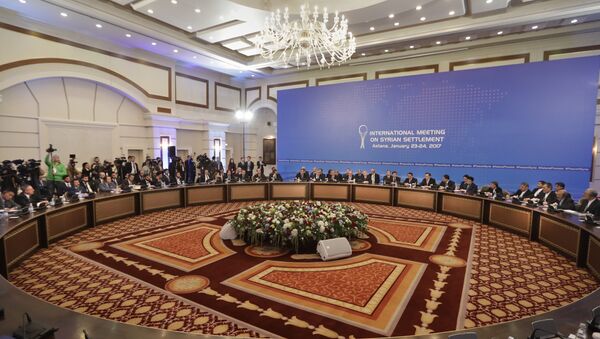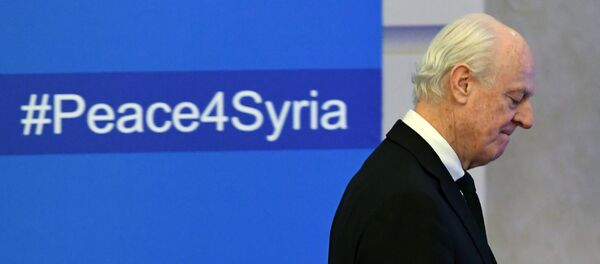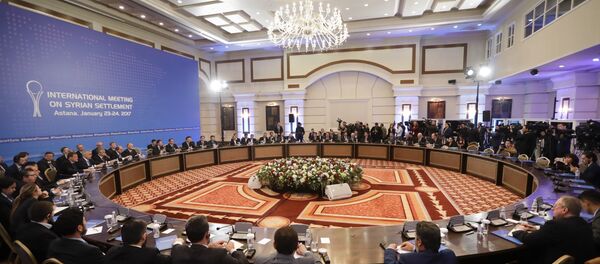Positive beginning
The current talks are the first time when parties to the Syrian conflict, which are fighting on the ground, are sitting at the same negotiating table, since the Syrian civil war started six years ago.
"This is a significant symbolic step, which allows to count on some possible progress, rapprochement of positions of direct parties to the conflict," the Russian president's special envoy for Syria Alexander Lavrentyev, who heads the Russian delegation at the talks, told Sputnik.
According to Lavrentyev, the participants of the meeting on Syria will on Monday and Tuesday continue working to agree the final document.
"Russia is in general satisfied with the results of the plenary session of the talks on Syria in Astana," Lavrentyev said, adding that however, "mutual distrust remains between the sides."
Turkish Deputy Prime Minister Veysi Kaynak told Sputnik that Astana talks gave hope for progress in Syrian crisis resolution, while laying a foundation for reaching the final agreement.
According to head of the Syrian government delegation to Astana Bashar Jaafari, the ongoing intra-Syrian talks in Astana are aimed at consolidation of the current ceasefire regime and strengthening of trust between the government in Damascus and the armed opposition groups.
At the same time, the agenda of the talks will be ready not earlier than by 2 a.m. local time on Tuesday [20:00 GMT Monday], Jaafari told reporters.
The next few days of intra-Syrian negotiations in Kazakhstan should be used to achieve a breakthrough in resolving the Syrian crisis, according to Kazakh Foreign Minister Kairat Abdrakhmanov.
Prospects of further talks
Russian Foreign Minister Sergey Lavrov said on Monday that the upcoming rounds of talks between the government and opposition, including the February 8 talks in Geneva, should be held with every opposition faction without exception.
"The subsequent rounds of intra-Syrian negotiations, including those scheduled in Geneva, will of course focus on the government's talks with all opposition groups without exception," Lavrov said.
According to the foreign minister, the armed opposition groups, currently attending the Astana talks, should join the political opposition platforms established in Riyadh, Moscow and Cairo.
"This will fully comply with the UN Security Council resolutions which require a fully inclusive intra-Syrian process that should include both the government and the entire spectrum of the opposition," Lavrov added.
"There is no meaning in a political solution [in Geneva], there is no reason in a political solution or go for a transitional period without implementing a ceasefire [which we seek to implement here]," Reis told reporters.
Armed opposition goals
The Syrian armed opposition seeks to achieve security in the country and establish a safe state without "tyranny", Mohammed Alloush, the head of the armed opposition delegation to the Astana talks, told reporters on Monday.
According to Alloush, the representative of the Jaysh al-Islam group, the opposition arrived in Astana in order to solve some humanitarian issues, such as release of prisoners, removal of blockade of Syrian cities, deliveries of humanitarian aid.
Opposition delegation member Yahya Aridi told reporters earlier on Monday that the success of Astana talks depended on successful negotiations on humanitarian issues, because "people are suffering on both sides."




